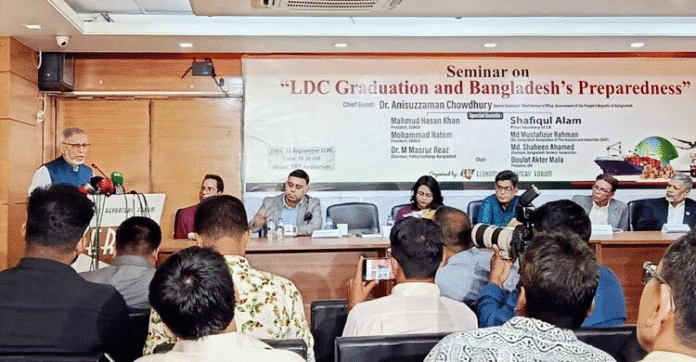Dr. Anisuzzaman Chowdhury, special assistant to the Chief Adviser on economic affairs, has called on Bangladesh’s business community to take a proactive role in securing international support to delay the country’s exit from Least Developed Country (LDC) group.
Speaking as the chief guest at a seminar titled “LDC Graduation and Bangladesh’s Preparedness”, held at the Economic Reporters’ Forum (ERF) auditorium in Dhaka, Chowdhury warned that the current timeline for graduation poses significant risks for the country’s export-driven economy.
He emphasized that the government alone cannot carry the burden of lobbying for an extension.
“With such limited time, it’s nearly impossible for the government to unilaterally negotiate a delay. Business leaders must engage with international buyers and importing nations. Gaining support from a few countries like the UK is not enough—broad-based international consensus is essential,” Chowdhury said.
The seminar was presided over by ERF President Daulat Akter Mala and moderated by the organization’s General Secretary Abul Kashem.
High Risks, Inadequate Preparation
Speakers at the seminar expressed concern that Bangladesh, given the scale of its export market, faces far greater risks in the post-graduation period than many other LDCs.
Without coordinated efforts between the government and private sector, they warned, the country may struggle to compete in global markets once preferential trade benefits are withdrawn.
Chowdhury noted that countries like Nepal and Laos have already sought extensions to their graduation timelines. “If they can do it, so can Bangladesh. But we need strong, credible lobbying efforts from the business community,” he said.
He also criticised earlier decisions that pushed Bangladesh towards graduation based on what he described as “flawed and distorted data.”
However, he acknowledged that the current interim government has made economic progress, citing improvements in pharmaceutical exports, national credit ratings, agricultural development, and bonded warehouse facilities.
Drawing comparisons to South Korea, Vietnam, and Zimbabwe—countries that managed to thrive post-LDC status—the CA’s special assistant expressed confidence in Bangladesh’s long-term potential but cautioned that “successful transition requires preparation, not optimism alone.”
Private Sector Voices Raise Alarm
Chief Adiviser’s Press Secretary Shafiqul Alam called for a cultural shift among business leaders. “Bangladeshi entrepreneurs must be willing to take calculated risks. Look at Vietnam—despite offering lower wages, they’ve become globally competitive, while we continue to lag despite enjoying several advantages.”
Mohammad Hatem, president of the Bangladesh Knitwear Manufacturers and Exporters Association (BKMEA), claimed that the original graduation decision was based on inaccurate data, leaving exporters vulnerable.
“Our export market is significantly larger than that of many other LDCs, which makes the risks of premature graduation even greater,” he noted.
Masrur Reaz, chairman of the Policy Exchange Bangladesh, noted that while graduation is inevitable, its timing should be reassessed through joint public-private dialogue.
He warned that unless the energy crisis and customs inefficiencies are addressed urgently, the economy could face serious disruptions.
Md. Mostafizur Rahman, CEO of the Bangladesh Association of Pharmaceutical Industries (BAPI), expressed concern that multinational pharmaceutical companies might cease local production due to higher post-graduation tariffs—leading to a sharp rise in drug prices.
Enamul Haque Khan, vice president of the Bangladesh Garment Manufacturers and Exporters Association (BGMEA), called for at least a three-year extension to the graduation deadline.
“If graduation happens without sufficient preparation, it could severely impact our export competitiveness. Smaller firms will be hit hard if subsidies are withdrawn abruptly,” he cautioned.

